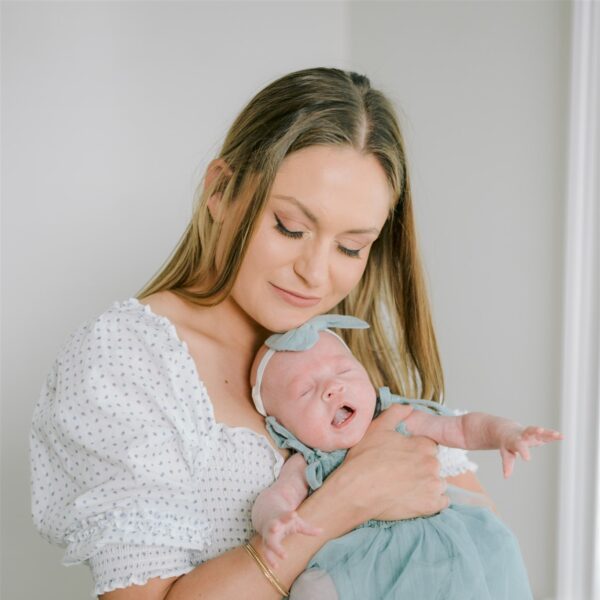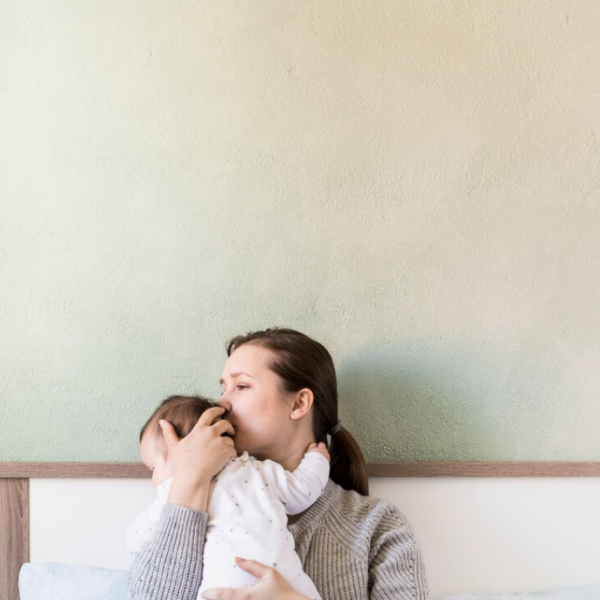Welcoming a new child into this world can be a time filled with excitement and joy. For new mothers, the postpartum period can bring a flood of emotions. While attention is given to postpartum depression, postpartum anxiety is another critical mental health condition that can affect new mothers. Recognizing the signs and symptoms is crucial for receiving timely support and treatment. Here are 6 common postpartum anxiety symptoms to look out for.

Signs & Symptoms of Postpartum Anxiety
1. Excessive Worry and Fear
While it is normal for new mothers to worry over their baby’s health and well-being, postpartum anxiety magnifies these worries to an overwhelming degree. You may find yourself constantly fearing for your baby’s health, safety, development, and nourishment, often dwelling on the worst possible scenarios.
This anxiety can then affect other areas of life, including concerns with your own health, relationships, and fearing whether you will be a good parent. The worry is persistent and disproportionate to the actual risk, making it difficult to focus on anything else.
2. Intrusive Thoughts
Intrusive thoughts are unwanted, disturbing thoughts that can feel frightening and distressing. For new mothers with postpartum anxiety, these thoughts often revolve around harm coming to their baby. Some individuals even report having flashes of images about dropping their baby, severely hurting their baby, or imagining terrifying, dangerous situations their baby may experience.
These thoughts are distressing because even though they are irrational, the fear is all too real. It’s important to understand that just because you think these thoughts, it does not mean the events will actually happen to the baby. Intrusive thoughts are a symptom of anxiety, not your ability to be a good parent.
3. Physical Postpartum Anxiety Symptoms
Postpartum anxiety can be felt physically in the body. Common symptoms include:
- Heart palpitations: A feeling that your heart is racing or pounding.
- Shortness of breath: Difficulty breathing, or feeling like you are not getting enough air.
- Sweating: Excessive sweating even when you are not exerting energy.
- Nausea: Feeling sick to your stomach.
- Muscle tension: Persistent tightness in your muscles.
4. Sleep Disturbances
Sleep difficulties are common for new mothers, but individuals with postpartum anxiety can make them worse. You may not be able to fall asleep, no matter how exhausted you feel. You may experience restless, uncomfortable sleep, with vivid nightmares that constantly wake you up. Lack of sleep creates a vicious cycle, as exhaustion increases anxiety, which then makes it even more difficult to sleep.
5. Irritability
When caring for a newborn, you may find yourself snapping at loved ones, feeling on edge, or being unable to sit still. These feelings, on top of the stress and fatigue you’re already experiencing with a baby, can also be a sign of postpartum anxiety.
Irritability can also feel similar to restlessness, being on edge and feeling like you need to be constantly doing something or you might explode. This hyperactivity can be a way to distract from anxious thoughts, but it can also lead to burnout.
6. Difficulty Concentrating
Postpartum anxiety may impact your ability to concentrate and make decisions. It may feel difficult to focus on tasks, forget things easily, or having trouble following through on responsibilities. The difficulty in concentrating is often because of constant worry and thoughts of frustration and inadequacy.
How to Seek Help and Support for Postpartum Anxiety
If you start to recognize these signs and symptoms, it’s important to seek help. Postpartum anxiety is a treatable condition, and early intervention can make all the difference.
- Talk to Your Healthcare Provider: Discuss your symptoms with a doctor or healthcare professional. They can provide you with a diagnosis and connect you with appropriate treatments.
- Reach Out to Support Networks: Connect with loved ones you trust, or seek support groups for new mothers that provide empathy and understanding.
- Consider Therapy: Therapy is an effective way to treat many anxiety disorders. A therapist can help you develop coping skills and manage your symptoms in a safe and welcoming environment. Contact us today to schedule your first session.





Leave a Reply